|
|
|
Sort Order |
|
|
|
Items / Page
|
|
|
|
|
|
|
| Srl | Item |
| 1 |
ID:
132471
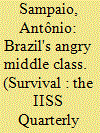

|
|
|
|
|
| Publication |
2014.
|
| Summary/Abstract |
The recent protests show that secure democracy and an absence of extremism are no guarantee of domestic stability.
On 26 May 2014, just a few weeks ahead of the World Cup, an angry crowd surrounded the Brazilian football team in Rio de Janeiro. Striking teachers attacked the team bus as it left the city's international airport, protesting the government's vast expenditure on preparations for the event and neglect of the education system. Heavily armed military police were called in to clear a path for the vehicle, and have followed the players ever since. For many Brazilians, passion for football was supplanted by demands for better infrastructure, salaries and quality of life: the 12 June Brazil-Croatia game that opened the tournament followed a year in which one person was killed and hundreds were estimated to have been injured in demonstrations around the country. This article went to press before the four-week-long competition had finished; football mania was at the time returning to Brazil. The country's mood was likely to be affected by the final result.
|
|
|
|
|
|
|
|
|
|
|
|
|
|
|
|
| 2 |
ID:
132468
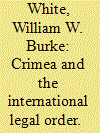

|
|
|
|
|
| Publication |
2014.
|
| Summary/Abstract |
Putin's exploitation of the tension between the principles of non-intervention and self-determination is in the tradition of great-power interaction with international law. But Russia's interpretation sets dangerous precedents.
Crimea is Russia's. The March 2014 referendum and Russia's subsequent annexation of Crimea are now events of history, even while the territorial borders and political future of the rest of Ukraine remain contested. Yet, as international attention has moved from Sevastopol to Kiev and more recent crises elsewhere, a key balance between two of the most fundamental principles of the post-Second World War international legal and political order remains at stake.
|
|
|
|
|
|
|
|
|
|
|
|
|
|
|
|
| 3 |
ID:
132463
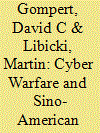

|
|
|
|
|
| Publication |
2014.
|
| Summary/Abstract |
China and the US both recognise that an armed conflict between them would include cyber warfare. But there is a curious and risky failure to connect the tactical military advantages of cyber attacks with the strategic hazards.
|
|
|
|
|
|
|
|
|
|
|
|
|
|
|
|
| 4 |
ID:
132470
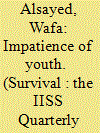

|
|
|
|
|
| Publication |
2014.
|
| Summary/Abstract |
Youth movements in the Gulf have been effective but ephemeral, sometimes manipulated by established groups or succumbing to social divisions.
In October 2012, thousands of citizens took to the streets of Kuwait City to protest an emergency decree by the emir that amended the country's electoral law in such a way as to undermine the position of the opposition within parliament. The demonstrations were unprecedented both in size and political rhetoric. An estimated 50,000 people addressed the ruler with slogans such as 'we will not let you'. Security forces used tear gas and stun grenades to break up the gatherings. Youth groups formed the backbone of the movement's leadership (at least initially) and supplied much of its rank and file. However, within months, this vibrant and defiant campaign had largely dissipated. Having failed to attain its goals, it was unable to maintain a permanent political presence. Throughout the Gulf region, other youth-led movements have suffered a similar fate. Once groups achieve their original goals or lose their initial momentum due to government resistance, they soon break down, often disappearing altogether from the political scene.
|
|
|
|
|
|
|
|
|
|
|
|
|
|
|
|
| 5 |
ID:
132474
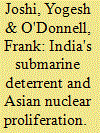

|
|
|
|
|
| Publication |
2014.
|
| Summary/Abstract |
New Delhi's plans for nuclear-armed submarines could undermine efforts to restrict fissile materials, and set off a naval arms race.
India has become a more or less accepted member of the global nuclear order, but the state's emerging undersea deterrent continues to be a source of concern. Its efforts to create nuclear-armed submarines began in the 1980s, and technical progress was slow during the project's first three decades. India has recently made some bold strides, however, and in 2009 unveiled its first nuclear submarine, INS Arihant. The boat is now undergoing sea trials, and is scheduled to be introduced into the Indian Navy by early 2015. Several similar vessels are under construction: New Delhi plans to field a fleet of between four and six nuclear-armed submarines by the end of the decade.
|
|
|
|
|
|
|
|
|
|
|
|
|
|
|
|
| 6 |
ID:
132467
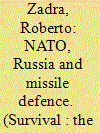

|
|
|
|
|
| Publication |
2014.
|
| Summary/Abstract |
Talks on NATO-Russia missile-defence cooperation were suspended in April during the crisis over Crimea. In retrospect, the window for a real breakthrough had closed some 18 months earlier.
After three and a half years of difficult discussions, the project exploring NATO-Russia missile-defence cooperation is not only suspended, but has probably reached its end. The initiative was an attempt to overcome Cold War thinking and realise the vision of the 2010 NATO-Russia Council Lisbon Summit: a 'true strategic and modernised partnership', and 'a common space of peace, security and stability in the Euro-Atlantic area'.
|
|
|
|
|
|
|
|
|
|
|
|
|
|
|
|
| 7 |
ID:
132465
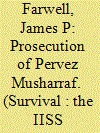

|
|
|
|
|
| Publication |
2014.
|
| Summary/Abstract |
In 2013, Pakistan's interior minister, Chaudhry Nisar Ali Khan, announced that the government would formally proceed with the prosecution of former President Pervez Musharraf on charges of treason for suspending the country's constitution in 2007, imposing emergency rule, and sacking most of the judiciary. Khan was not bluffing. Musharraf was indicted for high treason under Article 6 of the constitution, a charge that could carry the death penalty. A special court was set up to hear the case. Adding to Musharraf's woes, a 237-page report by the Federal Investigative Agency released last May denounced Musharraf's declaration of a state of emergency as illegal and in the service of his own 'ulterior motives'. The detailed report marshals significant evidence that Musharraf acted by fiat, without consulting other officials (such as his own prime minister, Shaukat Aziz) as required by law.
|
|
|
|
|
|
|
|
|
|
|
|
|
|
|
|
| 8 |
ID:
132464
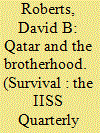

|
|
|
|
|
| Publication |
2014.
|
| Summary/Abstract |
In June this year, an Egyptian court's decision to sentence three Al-Jazeera journalists to lengthy prison terms marked a new low in deteriorating Qatar-Egypt relations, but was only one among many international-relations difficulties that the small Gulf state has faced in recent years. The tenure of Emir Tamim bin Hamad Al Thani, who ascended to the throne in summer 2013, has been something of an annus horribilis for Qatar, even in terms of the country's relations with its fellow Gulf Cooperation Council (GCC) states, with which it has much in common. Against a backdrop of sporadic intra-regional problems, the latest iteration of these difficulties crystallised in early March, when Saudi Arabia, the UAE and Bahrain took the unprecedented step of withdrawing their ambassadors from Qatar en masse.
|
|
|
|
|
|
|
|
|
|
|
|
|
|
|
|
| 9 |
ID:
132475
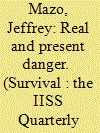

|
|
|
|
|
| Publication |
2014.
|
| Summary/Abstract |
The latest US assessments drive home the fact that dangerous climate change is not just a future risk. It is already here.
In parts of southern Florida, residents are seeing their streets flood at high tide as decades-old coastal defences fail to cope with sea-level rise. In Alaska, thawing permafrost is causing more than $10 million per year in damage to roads, runways and other infrastructure. The amount of precipitation in the northeast has increased by 8% since 1991 compared to the long-term average, but the amount falling in extremely heavy rainstorms or blizzards has risen by 71%. Nationally, river flooding has remained constant, but it has increased dramatically in the northeast and Midwest and fallen in the southeast and southwest. Nearly 20% of Arizona and New Mexico's forest land suffered heavy damage from wildfires and pest outbreaks due to warming and drought between 1984 and 2008. Insurance against climate-related disasters is becoming increasingly expensive in some places, and unavailable in others.
|
|
|
|
|
|
|
|
|
|
|
|
|
|
|
|
| 10 |
ID:
132473
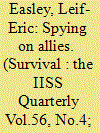

|
|
|
|
|
| Publication |
2014.
|
| Summary/Abstract |
Although some programmes crossed lines of propriety, US surveillance of partners did not constitute a breach of trust.
The United States is accused of monitoring the communications of other countries and collecting data on Internet users worldwide, following disclosures made by Edward Snowden, a former National Security Agency (NSA) contractor. US President Barack Obama implied that he did not order the NSA programmes for listening in on over 35 world leaders, including not only those of threatening states, but also those of allies, friendly countries and the United Nations.
|
|
|
|
|
|
|
|
|
|
|
|
|
|
|
|
| 11 |
ID:
132466
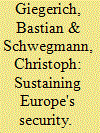

|
|
|
|
|
| Publication |
2014.
|
| Summary/Abstract |
The austerity efforts of European governments following the sovereign debt crisis have reinforced the long-running trend of shrinking defence expenditure in Europe. The need to implement a sustainable spending and budget policy in order to prevent young and future generations from being unduly burdened with debt is often used as the key justification. This argument makes obvious sense. But it isolates financial considerations and budget consolidation from a world in which the uncertainty of developments in the international security realm remains a core feature of international politics. The result is that the goals of financial policy and security policy are increasingly in conflict. Security policy, too, has to be sustainable for the state to discharge its responsibility for the security and freedom of its citizens in the future.
|
|
|
|
|
|
|
|
|
|
|
|
|
|
|
|
| 12 |
ID:
132472
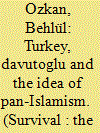

|
|
|
|
|
| Publication |
2014.
|
| Summary/Abstract |
Turkey's foreign minister was the first intellectual to devise a rationalistic and pragmatic Islamist foreign policy. Five years in office have exposed a huge gap between his ambitions and the country's ability to achieve them.
Over the past decade, Turkey's foreign policy has been synonymous with Ahmet Davutoglu and his doctrine of 'stratejik derinlik' (strategic depth). In 2010-11 he was on Foreign Policy's list of the 'Top 100 Global Thinkers'. Yet, despite this popular interest in Davutoglu, there are few academic studies of his foreign policy. He devised Turkey's current, pan-Islamist approach in his work as an academic during 1986-2002, detailing his vision in hundreds of articles published in that period. Davutoglu consistently argued that the end of the Cold War provided Turkey with a historic opportunity to become a global power, as long as it followed an expansionist foreign policy based on Islamist ideology. According to Davutoglu, Turkey was to dominate its hinterland - the Middle East, the Balkans and the Caucasus - and thereby create a new Lebensraum (he uses the Turkish words 'hayat alani', which is a direct translation of the German Lebensraum, or 'living space'). He began to turn his pan-Islamist vision into reality after 2002, following his appointment as foreign-policy adviser to the ruling Justice and Development Party (AKP), a position he held until he was made foreign minister in 2009.
|
|
|
|
|
|
|
|
|
|
|
|
|
|
|
|
| 13 |
ID:
132469
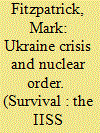

|
|
|
|
|
| Publication |
2014.
|
| Summary/Abstract |
On some issues, particularly Iran, the fallout has been negligible, yet there is still reason for concern. The gravest dangers are the devaluing of security assurances and cracks in the credibility of extended deterrence.
In the immediate aftermath of Russia's annexation of Crimea, gloomy predictions for the non-proliferation agenda were a commentariat staple. On some issues, particularly Iran, the fallout has so far been marginal. Yet there remains ample reason for concern, including over US-Russia cooperation on nuclear security. The gravest proliferation danger stemming from the crisis is the devaluing of security assurances of the kind provided to Ukraine in the 1994 Budapest Memorandum on Security Assurances and potential cracks in the credibility of extended deterrence.
|
|
|
|
|
|
|
|
|
|
|
|
|
|
|
|
|
|
|
|
|